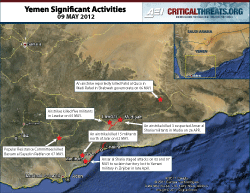 |
The unfolding terrorist plot is a reminder that al Qaeda in the Arabian Peninsula (AQAP), which has a sanctuary in Yemen, remains determined to attack the United States. Though targeted strikes have killed key AQAP leaders, the strikes have not fully disrupted its external operations. AQAP has benefitted from the successes of its insurgent arm, Ansar al Sharia, which is fighting to regain control of territory in the south.
Al Qaeda in the Arabian Peninsula (AQAP) attempted to attack the United States. U.S. officials reported that a plot to detonate a bomb aboard a U.S.-bound airplane has been thwarted. The explosive device, seized in the last ten days outside of Yemen, is a more sophisticated version of the 2009 underwear bomb built by AQAP’s top bomb maker, Ibrahim al Asiri. Authorities allegedly detected the plot in April.
Ansar al Sharia militants are contesting the Yemeni military’s control of territory in Abyan governorate, despite reports that Yemeni troops had secured areas of Zinjibar. Militants attacked an army base southwest of Zinjibar Monday morning, killing at least 20 Yemeni soldiers and injuring dozens more. The militants also captured over two dozen troops. Two months ago, an attack killed over 100 soldiers. Last Thursday, Ansar al Sharia attacked a Yemeni military position near Bajdar, outside of Zinjibar. Clashes are also occurring outside of Lawder in Abyan, where militants continue to attack Yemeni army positions.
An airstrike reportedly killed AQAP operative Fahd al Quso Sunday. Quso, who was connected to the USS Cole bombing, was killed in Wadi Rafad in Shabwah governorate along with his companion, Nasser Lakdam. Ansar al Sharia confirmed Quso’s death. Popular Resistance Committees of civilian pro-government fighters reportedly killed AQAP member Bassam al Sayed in the Radfan area of Lahij governorate on May 7. Yemeni airstrikes have targeted militant positions in Lawder in Abyan governorate, killing five militants Saturday. Airstrikes also reportedly targeted militant positions Jaar on May 2 and in Mudia in Abyan on April 26.
Military restructuring continues slowly. Tareq Saleh, former President Ali Abdullah Saleh’s nephew, retired from the Yemeni military and handed control of the 3rd Armored Brigade to Brigadier General Abdul Rahman al Halili. Tareq reportedly had refused Hadi’s April 6 appointment as commander of the 37th Brigade in the east. President Hadi made a series of appointments replacing Saleh loyalists from the military and government in early April and announced additional appointments at the end of April.
Houthi leader Abdul Malik al Houthi claimed that Saudi Arabia is preparing to attack northern Yemen in a statement on May 6. He warned that the Saudi regime has “financed civil wars” that have inhibited Yemen’s development. Yemen’s alliance with Saudi Arabia is a long-standing grievance of the al Houthi rebel movement which operates in northwestern Yemen. An al Houthi leader, Saleh Habra, reported that the movement would not participate in the upcoming Yemeni National Dialogue.
Please sign up for the Quick Take to receive these updates by email.
← PREVIOUS |
NEXT → |
